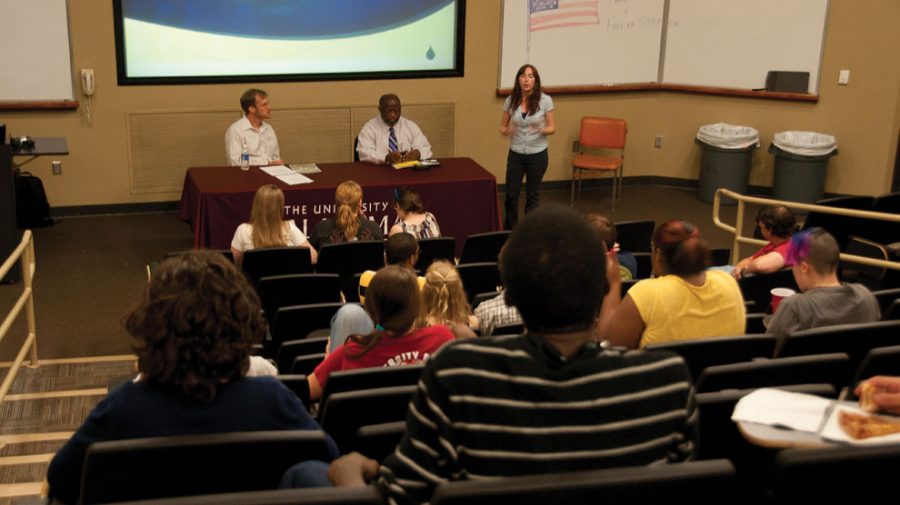The entire University of Alabama campus is a free-speech zone, but many students are unsure how far their right to free speech extends. Sustained Dialogue organized a forum to address the steps to having a protest, the reasons a request may be denied and why there have been few protests at all.
About 30 students gathered in Lloyd Hall with opinions and questions, ready to discuss these issues at the event, Free Food and Free Speech: Understanding Speech and Sponsorship Policies.
Joseph Smith, who teaches judicial politics and constitutional law, and Carl Bacon, the director of the Ferguson Center, were panelists. Student moderators Jamie Woodham and Marina Roberts, as well as the audience, asked questions.
Smith and Bacon both explained the application process as being simple and straightforward. Students must fill out an application 10 days before the desired date to use the University grounds for any reason. Non-students, such as open-air preachers, must attach themselves to a student organization and fill out the application.
A request cannot be denied because of the intended message. Smith explained this as content neutrality.
“If the University wanted to allow a pep rally, presumably, they’d have to allow the same sort of rally—same time, place, with the same size and amount of noise—for any other purpose,” Smith said.
The current grounds use policy was implemented three years ago and was last updated in August. Before this method, which consists of a one page application, Bacon said there was a much more complicated system.
“We estimated over 10 stops that you physically had to walk this piece of paper around campus,” said Bacon, who has been with the University for 20 years.
An issue that sparked conversation was the number of protests on campus. Both panelists and the student audience tried to explain why there seems to be fewer rallies or protests.
Bacon said the climate has changed dramatically during his 20 years at the University.
“Students [now] are busy; very, very busy,” Bacon said. “I was surprised when I got here 20 years ago because they protested everything, every five minutes.”
Smith offered as a cause the concept of the “chilling effect,” which is a vaguely written rule that discourages the average student from applying because he or she would think it would not be approved.
“People have the fear that they will get into trouble for things that they really wouldn’t get into trouble for,” Smith said.
Student attendees offered other causes, mainly social media.
“It’s easy to feel like you’re making a change or making a statement when you’re not actually doing anything,” said Kaylyn Johnson, the incoming political chair for Spectrum, an LGBT group on campus. “You have to be careful who you’re telling, so that your message actually does something.”
Smith questioned the existence of issues to protest about, bringing up the fact that there isn’t a draft now as there was during the Vietnam War.
“Is it the problem that people have things to say and they don’t say them, or is the problem that people don’t have things to say?” Smith said. “In places where something bad is going to happen to college students unless policies change, that’s where you have a lot of protests.”
Smith said the biggest hindrances to students are peer pressure and the reluctance to say what they know will be unpopular. He mentioned groups such as the Alabama Atheists and Agnostics and Spectrum.
Members from theses groups expressed interest in not simply protesting but providing visual demonstrations.
Junior Gordon Maples said AAA is successful in getting its message out through mediums such as chalking and its “ask an atheist” table.
“We have our own forms of getting our word out there that we think works better, and we don’t have go through all this red tape to do it,” Maples said.
Bacon said that 11,000 reservations are made in the Ferguson every year, but 6,000 other reservations are declined because of conflicts in time or place. He offered several tips for success for students interested in staging a rally or protest.
“Be detailed. Plan ahead. Try to be as proactive as you can,” Bacon said. “Have discussion and explain any details, anything you might think will cause a problem for your event.”
He said one of the major hindrances is communication issues, which contributed to the Environmental Council being placed in a taped off square when protesting the strip mine.
“Pick one person so you don’t wind up with multiple messages coming from multiple people,” Bacon said.
Michael Dewar, a senior and outgoing political chair for Spectrum, said he hopes to see more interaction between students and administration.
“In my time here, I feel like it’s taken me a couple of years really to get a feel for all the resources I have access to,” Dewar said. “Anyway that we can make sure that students know that they have those resources would be a great effort.”
Bacon said students should take advantage of the administration and faculty and staff.
“There are lots and lots of people here to help you, but sometimes you have to step outside your comfort zone, and that’s hard to do.”
At the end of the forum journalism student Rishon Hanners said anyone can get their message out, as long as they remember to use all the outlets at their disposal.
“I think every generation comes with issues that they think are important,” Hanners said. “I think that if you’re really interested and you want to persevere and get your voice heard and your opinion heard, then you can use every media outlet to your full advantage.”









